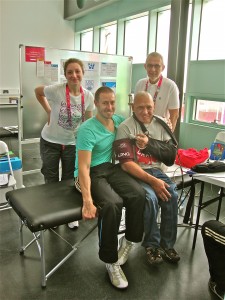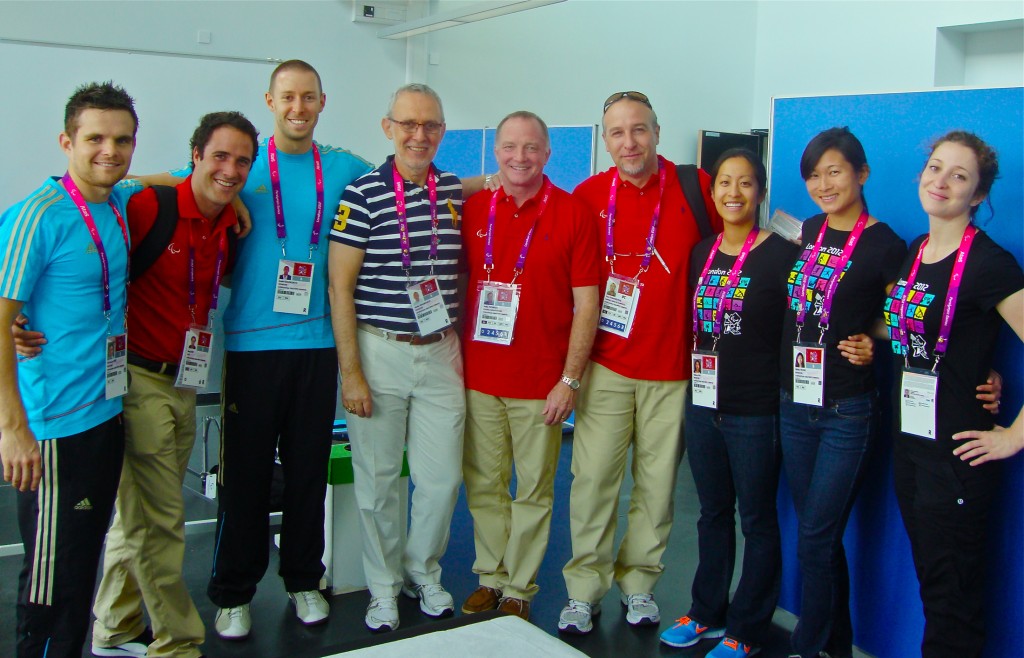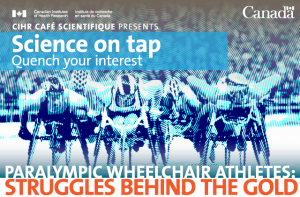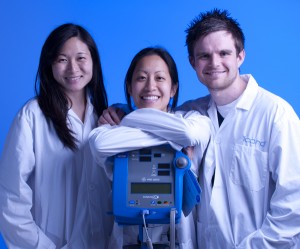Posts
- Oct 10th, 2012: Paralympic wheelchair athletes: struggles behind the gold:
- Sept 13th, 2012: Paralympic research clinic was a success
- Aug 30th, 2012: Paralympic clinic is up and running in London
- Aug 23rd, 2012: Paralympic Boosting: Dr. Krassioukov weighs in
- July 16th, 2012: ICORD team heading to London Paralympic Games
- Nov 29th, 2009: Cardiovascular Health Clinic for 2010 Paralympic Athletes
——————————————————————
Paralympic wheelchair athletes: struggles behind the gold
Originally posted on October 10th, 2012 here.
Join ICORD researchers Dr. Andrei Krassioukov, Dr. Chris West and Dr. Jaimie Borisoff on November 19th for refreshments and lively discussion about the challenges faced by paralympic athletes with spinal cord injury. Topics will include: the unique cardiovascular changes that occur following spinal cord injury, boosting, and personal reflections from a paralympic athlete.
Monday November 19th, 7-9pm at the Blusson Spinal Cord Centre.
This event is free, but space is limited: register now to avoid disappointment.
Participate online! This event will be webcast with the support of SCI-BC. Click here to join.
Supported by Canadian Institutes for Health Research and SCI-BC.
Join in the conversation on twitter by posting your thoughts, questions or comments during or after the Cafe using our hashtag: #struggle4gold
We will be live tweeting the event from @icord_sci, and look forward to seeing your tweets about the Cafe too!
——————————————————————
Paralympic research clinic was a success
Originally posted on September 13th, 2012 here.
Members of Dr. Krassioukov’s Paralympic research team had a great (and productive) time at the 2012 Paralympic Games in London. The Research Clinic was located in the Fitness Centre right in the buzzing Athletes’ Village. The team tested over 60 athletes from Columbia, Canada, United States, Italy, Algeria, South Africa, Australia, Brazil, Jamaica, Sweden and Turkey. “It was great getting to know the athletes and hear their amazing stories (and trade a few pins!),” said team member Jacquelyn Cragg. “We had several medal winners in the Clinic! We also got a chance to see wheelchair basketball, wheelchair rugby, athletics, and some swimming. Overall, it was an amazing experience!”

Team members Jacquelyn Cragg, Dmitry Krassioukov and Dr. Andrei Krassioukov with Canadian wheelchair basketball player Richard Peter at the clinic.
——————————————————————
Paralympic Clinic is up and running in London
Originally posted on August 30th, 2012 here.
Dr. Andrei Krassioukov and his research team have arrived in London and set up in the Paralympic Village. Trainee Jacqueline Cragg sends an update:
August 29th, 2012: We have arrived in London and have set up the Cardiovascular Health Education and Research Study. Our Clinic is in the busy Athletes’ village. In the clinic yesterday, we had two Paralympic wheelchair athletes from South Africa, two from Columbia, and one athlete from Australia. Tonight we are going to the Opening Ceremonies.

Christopher West (ICORD), Greg Vice (IPC Standing Committee), Dmitry Krassioukov (ICORD), Andrei Krassioukov (ICORD), Walt Thompson (IPC Standing Committee), Yves Vanlandewijck (IPC Standing Committee), Melissa Pak (ICORD), Shirley Wong (ICORD), Jacquelyn Cragg (ICORD). The Clinic is sponsored by Craig Neilsen Foundation and ICORD, and supported by the International Paralympic Committee (IPC)
——————————————————————
Paralympic Boosting: Dr. Krassioukov weighs in
Originally posted on August 23rd, 2012 here.
ICORD Principal Investigator Dr. Andrei Krassioukov is an expert on the subject ofboosting, and he’s been in high demand from national and international media outlets wanting his insight in advance of the upcoming Paralympic Games.
Boosting occurs when athletes with spinal cord injuries deliberately induceautonomic dysreflexia in order to gain an advantage in competition. Autonomic dysreflexia is a dangerous rise in blood pressure caused by a painful or non-painful stimulation below the level of injury. Below the SCI, their bodies cannot detect the stimulation and has difficulty properly responding. As a result, blood pressure can increase quickly, which can lead to serious consequences such as stroke, heart attack, or even death.
Dr. Krassioukov and his team will run an education clinic at the London Games.
Stories featuring Dr. Krassioukov’s comments include:
| Some paralympic athletes self-harm for competitive edge:Banned practice of “boosting” increases heart rate, blood pressure. CBC News. Aug 23, 2012 3:15 PM ET |
| Paralympic athletes who harm themselves to perform better. BBC News Magazine. 22 August 2012. |
| Why Paralympic Athletes Intentionally Mutilate Themselves Before Competing. Business Insider. Aug. 23, 2012, 10:21 AM |
| Fears Paralympians with spinal injuries will self-harm in bid to boost their performance during the Games.Mail Online: PUBLISHED: 12:39 GMT, 23 August 2012 |
| Canadian Researcher Works to Make Paralympic Games Safer:Performance enhancement among disabled athletes carries high risks.US Politics Today. 23 August 2012 |
| Boosting, a cheating method used by athletes with spinal injures, is the Paralympics’ dirty little secret. Yahoo Sports (reprinted in many publications) . 23 August 2012 |
——————————————————————
ICORD team heading to London Paralympic Games
Originally posted on July 16th, 2012 here.
CIHR-funded spinal cord researcher Dr. Andrei Krassioukov is taking a team to this year’s Paralympic Games in London, but instead of competing in sporting events, the ICORD scientists will be conducting research and providing wheelchair athletes with crucial information about cardiovascular health during training and competition.
With core funding from the Craig H. Neilsen Foundation, Dr. Krassioukov and his 5-member team will operate a cardiovascular health clinic in London’s Olympic Village from August 29th to September 9th. One area the research team will investigate is autonomic dysreflexia, in which Dr. Krassioukov is a world expert. Autonomic dysreflexia is a drastic increase in blood pressure striking people with cervical and upper thoracic spinal cord injuries (SCI). If left untreated, it can lead to bleeding in the brain and or death.
This unstable blood pressure control is a concern to the general SCI population, but especially to athletes with SCI. Dr Krassioukov believes there needs to be much greater awareness of this issue. “With Paralympic athletes, we have two problems in this area,” says Krassioukov. “One is those who don’t know this is a risk and need crucial, practical information. The other is athletes who are aware of autonomic blood pressure spikes and will actually attempt to use it as a competitive advantage, which is extremely risky.”
The purpose of the clinic in London is twofold: it will allow Dr. Krassioukov and his team to provide evidence-based clinical knowledge and crucial practical information on unstable arterial blood pressure control among athletes with SCI to Paralympians and their coaches at the 2012 Summer Games, and continue the research in this area that they started at the 2010 Winter Games in Vancouver.
The clinic expects to see 60 wheelchair athletes during the games–40 with traumatic SCI, and 20 without. They will be providing information on three cardiovascular conditions common among athletes with SCI: autonomic dysreflexia, boosting (intentionally inducing autonomic dysreflexia to improve athletic performance) and orthostatic hypotension (drops in blood pressure that occur when transiting from lying down to sitting up, which can cause dizziness, or fainting).
The team will also perform various heart rate and blood pressure tests to investigate the presence and severity of autonomic nervous system dysfunction in wheelchair athletes. As autonomic dysfunction is unique to persons with SCI, it is possible that these athletes are at a disadvantage when competing against athletes with similar motor function but no SCI.
Earlier this year, Dr. Krassioukov was awarded a $1.9 million Team Grant by CIHR to study cardiovascular health, including autonomic dysreflexia, in people with SCI.
An article about Dr. Krassioukov’s research into boosting appeared in the Txchnologist blog on August 2nd, 2012.
Dr. Krassioukov was interviewed for this story about boosting in the Mail Online on August 23rd, 2012.
——————————————————————
Cardiovascular Health Clinic for 2010 Paralympic Athletes
Originally posted on Nov 29th, 2009 here.
Paralympian athletes are exposed to tremendous physical and emotional stress during training and competition, and athletes with spinal cord injury (SCI) have unique disadvantages during competition. One of these disadvantages is unstable blood pressure control. On a daily basis, individuals with SCI deal with either extremely low resting blood pressure, and/or uncontrolled episodes of high blood pressure. The latter is called autonomic dysreflexia (AD). Low blood pressure and a poor response from the heart results in significant fatigue and presents a serious problem for athletes during both training and competition. In contrast to low blood pressure, AD is a life-threatening situation whereby individuals with cervical and upper thoracic injuries experience a drastic increase in blood pressure. If left untreated, AD can lead to bleeding in the brain and/or death.
ICORD researcher Dr. Andrei Krassioukov is an expert in AD, and has just received funding from the Craig Neilsen Foundation to bring evidence-based clinical knowledge and crucial practical information on unstable arterial blood pressure control among athletes with SCI to Paralympians and their coaches at Vancouver’s 2010 Winter Paralympic Games.
This project is a collaboration between clinicians and scientists from ICORD, individuals with SCI in the BC Wheelchair Sports Association and former Paralympic athletes. For more information, see this page.
This project has been approved by the International Paralympic Committee (IPC) and recently received financial support from The Craig H. Neilsen Foundation.



